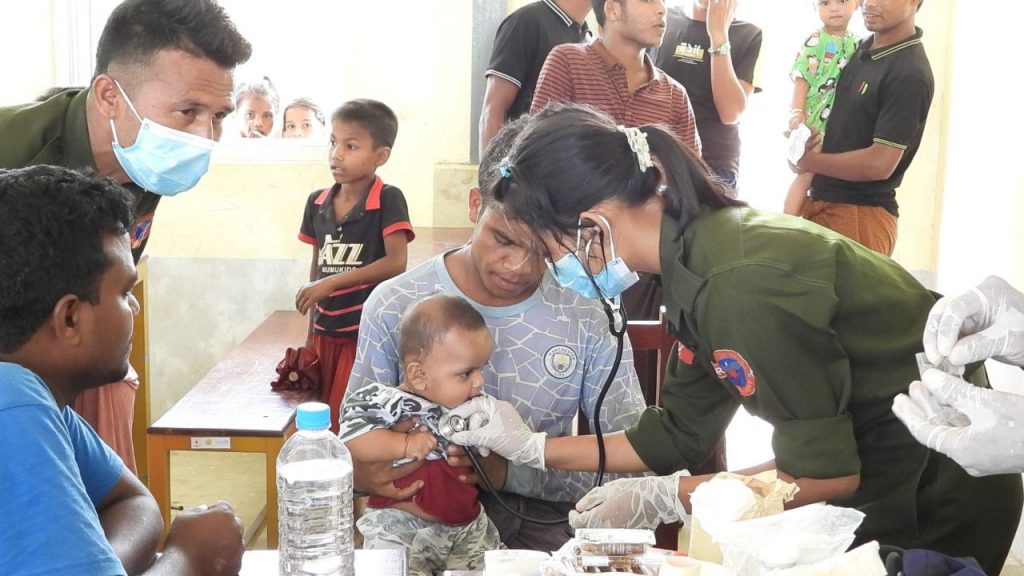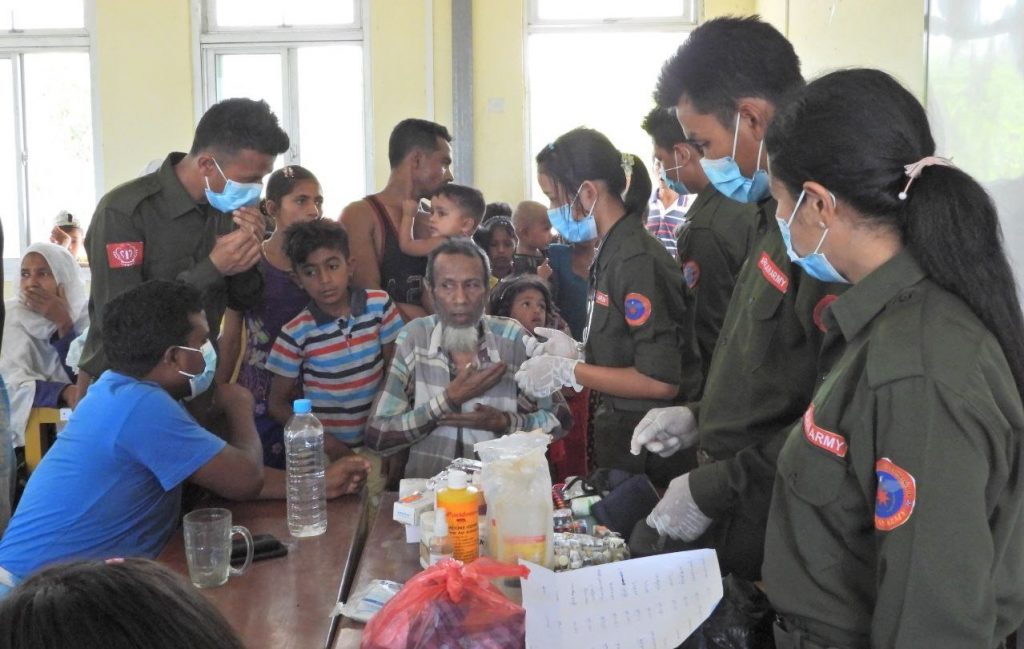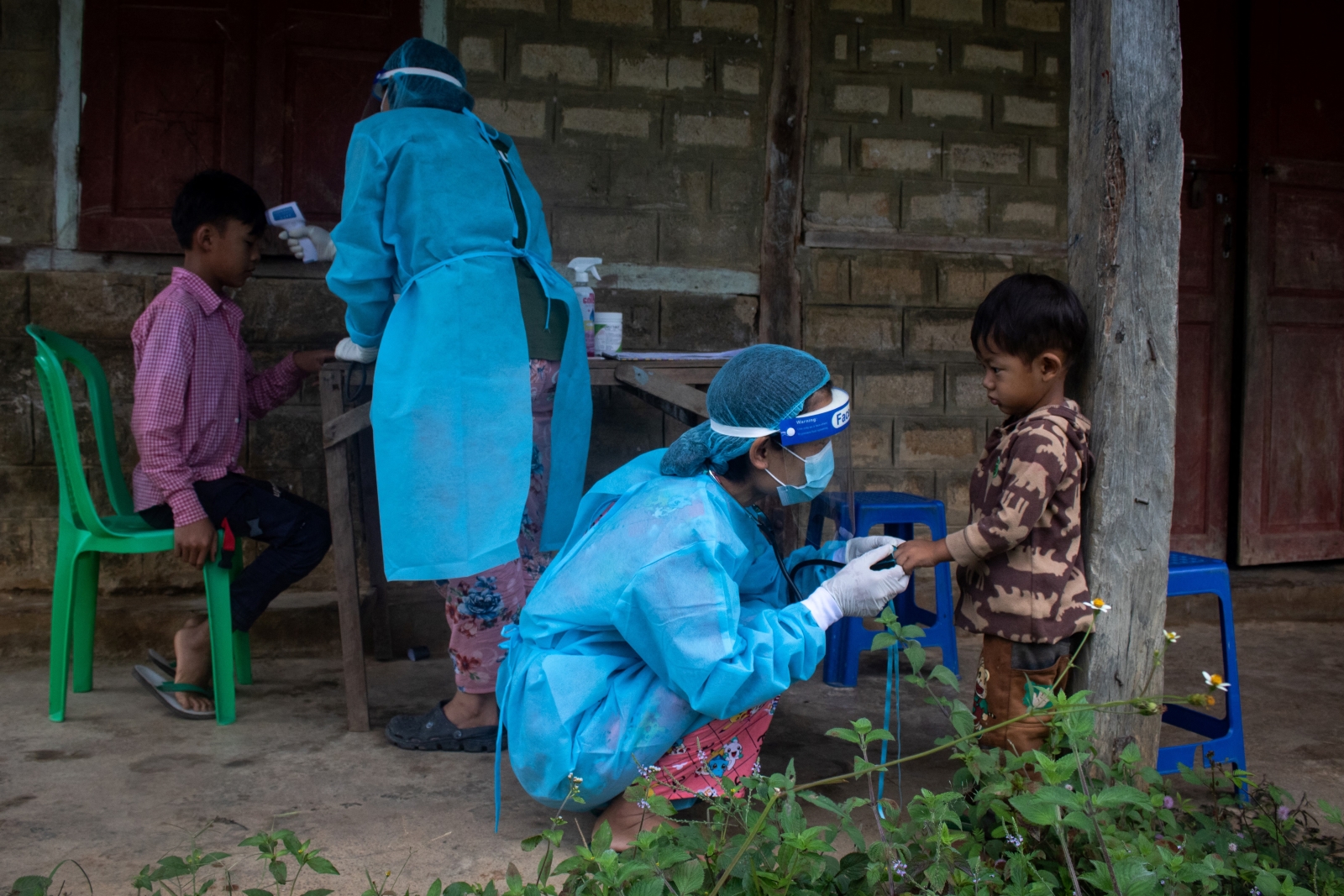The Arakan Army and its political wing, the United League of Arakan, have unveiled a political dispute mechanism and plans for a judiciary in Rakhine State as part of their moves to “bring justice to all people living in Rakhine.”
By KYAW HSAN HLAING
The United League of Arakan is advancing steadily towards its objective of assuming administrative control in Rakhine State, and has seen a high level of compliance from the state’s residents with the stay-at-home order it issued on July 20 in response to the third wave of COVID-19. Since the coup, the ULA and its armed wing, the Arakan Army, have accelerated their effort to expand their ability to govern the state and be seen as its legitimate governing body.
About 75 percent of the population of Rakhine State is complying with the order issued on July 20, Brigadier-General Dr Nyo Twan Awng, deputy commander-in-chief of the AA, told Frontier on July 31.
“It would be better if there was 100 percent compliance,” he said, adding that the state’s status as one of the least economically developed areas of Myanmar leaves it vulnerable and a high level of compliance would help prevent the spread of COVID-19.
In its statement announcing the stay-at-home order, the ULA had warned that legal action would be taken against anyone who did not follow the directive. Meanwhile, the Rakhine State Administrative Council has taken some minor actions like distributing food aid, but has not issued any stay-at-home orders or other restrictions.
The ULA is also making inroads on the legal system in the state. On August 1 it announced the establishment of a dispute resolution mechanism. A statement said all legal disputes, including over land, as well as cases involving violence and theft, should be submitted to the ULA.
The Rakhine State Administration Council has also stepped up its plan to exert control in Rakhine. On August 5 it announced plans to implement household registrations throughout the state as well as for day and night patrols “as a response to COVID-19 outbreak and state’s security.”
De facto administration
The AA’s campaign for greater autonomy resulted in heavy fighting with the Tatmadaw for two years until hostilities ended in an informal ceasefire after the November 8 election last year. The conflict caused significant disruption to lives, livelihoods and the economy, displaced more than 230,000 civilians, and left nearly 1,000 dead or injured, including more than 170 children.
As the fighting escalated, the National League for Democracy government called in January 2019 for the Tatmadaw to “crush” the AA. In June that year, the government imposed on Rakhine State what was to become the world’s longest internet shutdown, which was justified as a necessary response to the insurgency. In March 2020 the NLD government designated the AA and the ULA as terrorist organisations. The NLD government also excluded the AA from the peace process, blocked humanitarian assistance to people affected by the fighting.
When the Union Election Commission appointed by the NLD cancelled the 2020 election in much of Rakhine on the grounds of “security,” it disenfranchised an estimated 73 percent of the state’s voters. As a result many of the state’s residents shifted their support to the AA. The armed group has been slowly building up its administrative capacity and began accelerating these efforts after the coup.
On April 11, the 12th anniversary of its founding, AA commander-in-chief Major-General Twan Mrat Naing said in a statement that it had turned its focus from the mobilisation and military affairs of its early revolutionary period, to implementing “a governance mechanism with strong institutions for public administrative affairs, including administration, a judiciary and public security”.
The AA’s local administrators, who have been gaining popular support since before the coup, are responding to an increasing number of residents seeking the resolution of legal disputes, and crimes ranging from robbery to murder.
Under the NLD government, local administrators were stuck between the central government and the AA’s de facto administration. In early March 2019, hundreds of ward and village tract administrators in northern Rakhine resigned because they feared being accused of associating with the AA and being arrested by the military. Some said they quit because they preferred the AA administration.
The AA has influence over two-thirds of Rakhine State, claims Nyo Twan Awng.
“We can mainly undertake rule of law issues and administration in these areas,” he told Frontier on August 3. “AA is engaging executive and judicial responsibilities.”
Nyo Twan Awng says the AA has already trained hundreds of administrative personnel. The administrative body, the Arakan People’s Authority, says it has solved over 550 cases from more than 1,400 complaints received, ranging from petty quarrels to land disputes and murder.
“With as few weaknesses as possible, we are trying to bring justice regardless of race and religion for the people living in Rakhine State,” Nyo Twan Awng added. “Looking through the lens of international law, we might still have some weakness today, but we are developing for independent justice.”
The AA said that although not all ethnic groups and religions are represented among Arakan People’s Authority personnel, community leaders are involved in dispute resolution involving different communities. This was an issue under the NLD government, when members of minority religions and ethnic groups in the state were excluded from government positions.
“We intend to bring justice for all people living in Rakhine State, regardless of race and religion,” Nyo Twan Awng said.
Return of the rule of law
The ULA’s recent initiatives, including the dispute resolution mechanism, have largely been welcomed by civil society groups and prominent members of Rakhine political parties.
U Khaing Kaung San, director of the Sittwe-based Wan Lark Foundation, said the move was essential for the state because residents of some townships could not lodge complaints with the regime’s judiciary and law enforcement departments.
“People need a place where they can file complaints for justice,” he said.
A senior member of the Arakan National Party, U Pe Than, has been quoted as saying that the ULA’s administrative mechanism was working better than that of the regime council in Rakhine.
The ULA announcement about dispute resolution marked the start of the return of the rule of law in the state after the fighting between the military and the AA, Pe Than told DVB.
Ma Su Mrat Htwe, a founder of the Rambree Youth Network based in Ramree Township, said that even before the election last November, residents of the township were seeking assistance from the AA office.
She said that government township administrations answer to the ULA. “Even the public service departments are under control of the ULA,” she told Frontier. “After the coup in February, the people afforded the ULA more legitimacy than before.”
However, she expressed concern about the misuse of authority by AA members at the local level. “Solidarity prevails, but these power abuse issues must be dealt with,” she said.

Potential for abuse of power
Five days after the ULA issued its stay-at-home order on July 20, Twan Mrat Naing issued a speech via video clip on social media, in which he spoke of its attempts to acquire vaccines and also made the claim about 75pc of the population adhering to the order.
Referring to reports from some townships, including in Sittwe, of people continuing to eat out at restaurants in defiance of the stay-at-home order, he warned that such behaviour was “absolutely not acceptable”.
Nyo Twan Awng said that one of the challenges the ULA faced would be arranging the transport of vaccines to Rakhine because they would need to pass through checkpoints controlled by the SAC.
“When we overcome this problem, we will strive to provide vaccines to all people of Rakhine State regardless of race and religion,” he added.
The ULA has been punishing people for flouting the stay-at-home order and beatings with sticks have been administered to miscreants in some of the state’s northern townships, residents said. The ULA has also used stun grenades in Sittwe against people caught defying the order.
Khaing Thuka was quoted as saying in local media on July 31 that the AA detonated the stun grenades as a warning against gathering in groups and warned that those who continue to ignore COVID-19 restrictions would be punished.
U Khine Murn Chun, president of the Mrauk-U Youth Association, said the use by AA of physical punishment to enforce the stay-at-home had enabled it to achieve 100pc compliance in rural areas.
“In Mrauk-U, the street gambling and alcoholic crowds are restricted by AA, even in downtown areas,” he told Frontier. “Generally, it can be said that AA controls urban and rural areas in all of Rakhine,” he said.
Kyauktaw resident U Zaw Win, 40, said the AA had earned the people’s support because they preferred to have a government comprised of their own ethnic group. He complained that the state has not had a government that stood up for its people in recent years.
“As a result of bold action, the Arakan Army has earned the undeniable support of the people of Rakhine State,” he told Frontier. “The people in Rakhine State have been hungry for a government that properly represents their interests or a government that derives its power from the people of the state,” he added.
Vaccination rollout
The third wave of COVID-19 has had a devastating effect on Myanmar since it began in late June, about a month after the Rakhine health department reported four positive cases among about 40 people involved in trade with Bangladesh. Since then, the state has been reporting about 100 cases a day and there have been dozens of deaths.
Civil society groups have established quarantine centres in the capital, Sittwe, and the AA has responded to plans by the military council for a vaccination rollout by promising to secure supplies of vaccines by any possible means.
The AA has been able to make a more effective contribution to COVID-19 prevention and control efforts in Rakhine as a result of the military’s decision to remove the powerful ethnic armed group from its list of terrorist organisations in March, about a month after it seized power.
As the number of COVID-19 cases rose in Rakhine, so did the level of dissatisfaction among the state’s residents over the military council’s response to the outbreak.
In early July, after about 150 border guard police and their family members at Maungdaw and Buthidaung townships in northern Rakhine tested positive for COVID-19, civil society groups accused military-controlled authorities of not doing enough to fight the coronavirus.
The military council has said that three million doses of vaccine arrived in Myanmar in July and another three million doses were due in August. Vaccination programs have begun in at least three Rakhine townships since the end of July.
However, moves by the military council to take control of privately-owned oxygen plants in Rakhine and to ban government health workers from talking to the media, have fuelled more anger among residents and civil society groups.
AHCT secretary Khaing Kaung San, from the Wan Lark Foundation, told Frontier that the SAC does not have a proper understanding of the situation and is trying to spread propaganda.
“The government spreads propaganda that there is enough oxygen. As well as a shortage of oxygen there is also not enough oxygen cylinders,” he told Frontier.
In Rakhine during the second wave, civil society groups joined forces to establish the Arakan Humanitarian Coordination Team, which set up quarantine centres for people who had been in contact with COVID-19 patients.
However, the AHCT says it has received no cooperation from the military during the third wave. With many of the sick unable to afford hospital treatment, many Rakhine infected with COVID-19 are struggling at home with relatives or friends desperately trying to secure medical oxygen for them.
Zaw Win, the Kyauktaw town resident, said people were not happy with the junta’s response to COVID-19.
“If they think of themselves as a government, they must act like a government, but they are acting like an autocratic elite that oppresses people,” he told Frontier on July 28.
“We don’t really have faith in the military regime, because a real government does not act to destroy civilians; people throughout the country are at risk,” he added.
Kyaw Hsan Hlaing is an independent researcher and journalist writing on politics, human rights, and issues related to ethnicities and the military coup in Myanmar at Major Global Outlets including TIME Magazine, Al Jazeera, Los Angeles Times, and Foreign Policy. He is also one of the 2021 Human Rights Press Awards winners.







